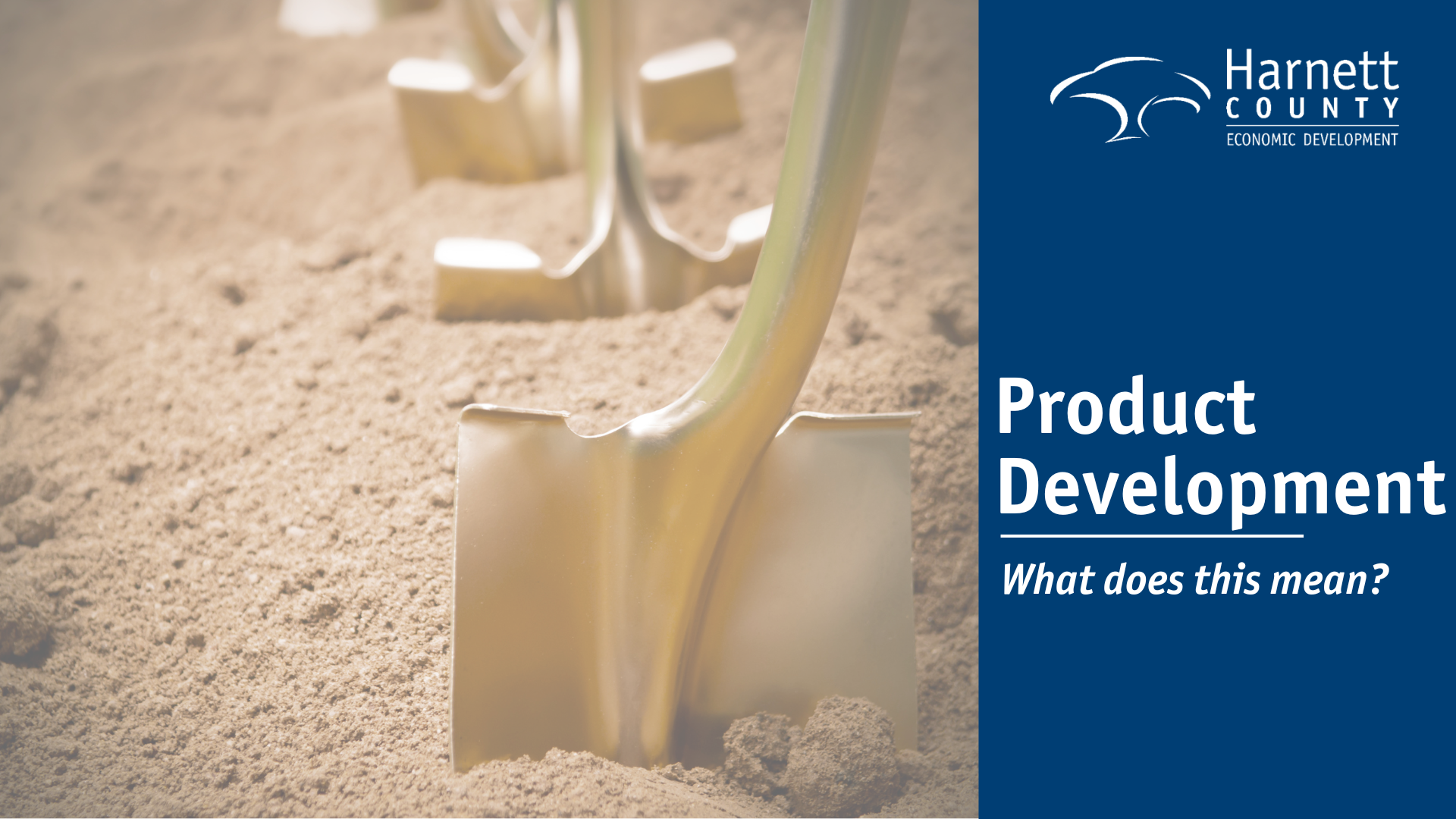Economic Development Highlight: Product Development
Thursday, January 18, 2024
Stephen Barrington discusses what product development means for Harnett County and why it will be a focus for the economic development team moving forward.
Product development is a leading activity for Harnett County's Economic Development Team. What do we mean when we say, “product development”? We are talking about real estate – dirt and buildings.
Using sports as an analogy – Without product, we are neither on the sidelines nor in the stands, and we certainly are not playing in the game. We are simply watching a game on television or reading about post-game highlights in the paper.
Jay Garner, a site selection consultant in Georgia, and Ross Patten, an economic developer in Kentucky, jointly wrote, Economic Development is Not for Amateurs. In Chapter 2, they go on to say, "product equals buildings (not sites), and “no product, no project.” You cannot sell from an empty wagon.
When describing Harnett County's product development activities, we are often working in multiple subcategories simultaneously, to include:
Site Identification – We are referring to “land.”
Our focus is twofold:
1) To inventory sites in which we are informed that property owners are interested in selling; and
2) To identify sites in which we do not know the owner’s intention, but whereby we identify their property as one that could potentially serve as a future industrial site/park or a business/office complex.
We initially look at a number of high-level variables that are important to industrial sites/parks and those important to business/office sites/complexes.
Variables that we look at will slightly differ from that of industrial and business/office. However, some of the variables include:
- Infrastructure availability, capacity, flow, etc. (water, sewer, electric, natural gas, fiber)
- Proximity to four-lane roads
- Rail access or proximity to a transload facility
- Zoning
- Etc.
Upon completion of the site identification project, we should have a small, preferred, list of sites ideal for a future park or complex. At this point, we will discuss with owners their interest in selling their property for such use [in the future].
Site Readiness – “Clean bill of health.”
[“Site readiness” and “due diligence” are being interchanged with one another.]
A lot of work and effort goes into environmentally assessing land prior to a company or developer pulling the trigger to close on a property. Tens of thousands of dollars are routinely expended during this phase. However, buying the wrong property without such assessment could lead to a costlier disaster.
Assessments include, though are not limited to: Phase 1 Environmental Assessment, Wetlands Delineation or Determination, Geotechnical Report with soil borings, Threatened and Endangered Species, Cultural and Historic Report, Survey (boundary and topographical), and Jurisdictional Determination among others.
Recently, several on our team were at a North Carolina Economic Development Association (NCEDA) conference, and there was a panel that discussed the importance of marketing sites in which site readiness activities have been completed. They honed in on two distinct points:
1) Time – A company, during this process, is interested in getting to decisions quicker than later, with the goal of becoming operational sooner than later. Companies simply do not have the time necessary to perform due diligence activities on each site they consider. Thus, sites that do not have the majority of “standard” due diligence completed, such as those items listed above, are not being considered.
2) Risk Mitigation – While 100% of potential environmental issues will not be known, even upon completing the site readiness activities, enough will be known to give the developer or company enough confidence about a property to know whether or not a project can occur on site.
Site Development – Quicker to the market.
We feel good about a property after completing site readiness activities. Now it’s time to do more work:
- Masterplan the property;
- Have a civil engineer design any new road planned, including entrances into the development;
- Construct a new primary road, even if stubbed;
- If water and sewer lines are not at the property, consider extending them to the site. If it is cost prohibitive to do so, make sure to understand how much it will cost for the developer or new owner to extend the lines;
- Ensure appropriate zoning;
- Have the Planning Board review the project; and
- Obtain permits as it makes sense.
Risk mitigation is largely accomplished with site readiness. While time is also highlighted under site readiness, site development activities further reduces the time it takes for companies to become operational.
Shell/Spec building development – Two thirds of all new company inquiries we receive are interested in an existing building.
For all the work that we have achieved via site identification, site readiness, and site development, we still may not have a property to submit based on inquiry requirements.
The good thing about the hundreds of inquiries we have received is that we have a pretty good idea of the types of building requirements that are routinely being considered. Essentially, we know what product is moving and what is not.
While we strongly prefer private sector investors and developers to build-out our inventory of available buildings, sometimes it is important for a local government entity to step up to kick-start building activity. The goal is not for the public sector to become the market, but to spur private sector development.
Local government entities that are willing, and have the ability, to invest in product development – both sites and buildings – and those who are willing to be financially creative with private sector investors and developers on the front-end, are setting their community up to be more competitive when new project inquiries come knocking.
Harnett County, North Carolina’s County Administration and Board of Commissioners have a bullish approach to product development that will pay dividends for the county, and for generations not yet born.
For more information on product development in Harnett County, please contact the Harnett County Economic Development Team.

